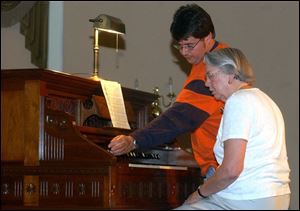
Fayette: Promoting village a top priority
4/13/2005
Reed organ restorer Casey Pratt, left, and composer Marcia Hendron at Fayette's popular Reed Organ Festival, May 2004.
FAYETTE - Summer theater, a national reed organ museum, and beachfront property could coax visitors to this landlocked Fulton County community, where residents are pulling together plans to promote tourism.
Tongue-in-cheek, Tom Spiess says that yes, the village has beachfront property - it's just that the lake has left town. Various shorelines of the ancient lake known as Lake Maumee remain today as sandy ridges, and Mr. Spiess, the village administrator and long-time promoter of Fayette, says that perhaps the town can capitalize on that ridge.
Dollar wise, sandy ridges matter to Fayette today, said Peter Wilhelm, heritage arts director at Northwest State Community College near Archbold. He has researched and studied beach ridges.
"Beachfront property has a certain economic-drawing ring to it," he said. "They can honestly claim there is beachfront property because there was a beach there."
Trails and roads ran along the sandy ridges, and in Fayette, highways carry thousands of people through the town each day. The goal is to get some of those people to stop by to shop or dine, or to attend a theater production or a festival.
In an effort to pick up some tips on tourism, a group of Fayette residents recently trekked to Frankenmuth, Mich., where they met with officials from the community and the Frankenmuth Chamber of Commerce and Convention and Visitors Bureau. Some Fayette residents walked the business district, looking at the retail blend, Mr. Spiess said.
Frankenmuth, known as "Michigan's Little Bavaria," attracts more than 3 million visitors annually. Its Main Street is lined with shops selling toys, fudge, cheese, sweaters, clocks, sausage, wine, artwork, and souvenirs. And, there's Bronner's Christmas Wonderland, the gigantic mecca for holiday decore that bills itself as the "world's largest Christmas store".
Jennifer Tebedo, president of the Frankenmuth Chamber of Commerce and Convention and Visitors Bureau, said that on occasion, visitors come to her office to talk about the tourist trade. Some are interested in learning how her office works as a joint venture of the chamber and the convention and visitors bureau. Some communities keep those two entities separate.
Fayette also has looked at another popular destination, Cornwell's Turkeyville USA, and its dinner theater, gift shops, and flea markets in Michigan.
Fayette residents have figured out that they need to turn the town into a destination location to attract crowds during the week.
To perk up the tourist population, to keep restaurants cooking and the Fayette Opera House humming, "we need one or two bus loads coming in three days a week," Mr. Spiess said.
The same day the Fayette group went to Frankenmuth, the village lost a restaurant, Ned's Place, because of lack of business during the week, he said.
"We need a reason for people to come to Main Street," said Mr. Spiess. His plan has a common thread: stitch together "little slivers of cultural uniqueness."
Possibilities are many:
Revive the Ginnivan Tent Show that featured a three-act play and vaudeville-style skits. It traveled during the summer months within a 90-mile radius of Fayette until 1942, when it shut down.
Create a national museum and workshop for reed organs. This effort would involve Don Glasgow, who spends his spare time at the opera house restoring reed organs. Active in the Reed Organ Society, Mr. Glasgow is known locally as the master artist who pumped new life into a rare three-keyboard organ that makes its home in the opera house.
Launch cooperative ventures with established entities including the Fayette Arts Council, Harrison Lake State Park, 4-H Camp Palmer, and local bed-and-breakfasts.
Offer summer theater at the opera house. First, however, the landmark needs an air-conditioning system at an estimated cost of $60,000. So far, $20,000 has been earmarked for the improvement.
Expand the Civil War re-enactment and encampment event that was held for the first time last year in town. Mr. Spiess has a five-year plan for this sketched out, and tactical meetings are under way.
With concepts in hand and ideas in mind, it is now time for the community to decide where it goes from here, Mr. Spiess said.
"We need to figure out how we do this, how we move forward."